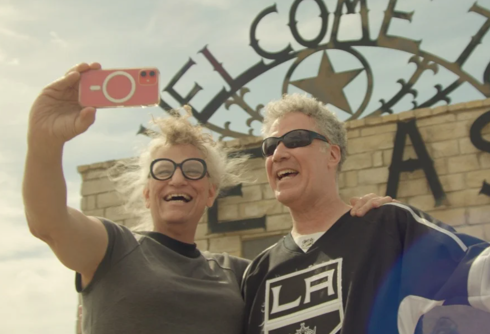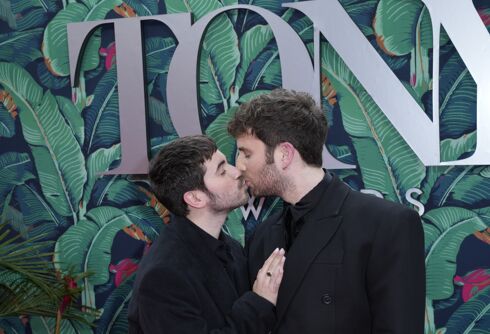Some time in 2018, I stumbled across the idea that gender isn’t binary. Suddenly, more than four decades of intense discomfort and confusion over my inability to do “girl” right made complete sense.
I knew that if I were a teenager or even in my twenties, I’d be out as nonbinary in a nanosecond. But it seemed odd as an older adult. My years of trying and failing at dating were in the books and I’d happily settled into a life I was actually enjoying for the first time. Work was good, I loved my house with the many custom bookshelves I’d built, and I was finding my feet as a novelist.
It just didn’t seem worth it to rock the boat. I didn’t want to draw unnecessary attention to myself and make a fuss.
Related:
Autistic people aren’t being fooled into being nonbinary. We see past the binary that fools you.
We examine social norms that others accept without question, so we’re more likely to reject the idea that everyone has to be a man or a woman.
Never Miss a Beat
Subscribe to our newsletter to stay ahead of the latest LGBTQ+ political news and insights.
Still, the idea needled my ostensibly satisfied brain. What would it be like if I’d been a teenager now instead of the 80s and 90s? I wasn’t sure of the answer, but I had this growing sense that it was a story worth telling.
In November, I started the book I’d already dubbed Ugly, where I imagined myself in small-town Oklahoma growing up with the same judgment and bullying I’d faced as a kid and all the resulting feelings. The difference was the existence of Google. After a few days, it was clear a dam had burst.
Before the end of the month, I wrote over 80,000 words—around 350 pages—and had a draft that told a story that I knew mattered.
That first brain dump draft needed a lot of revision, but I worked at it and found myself wishing I were a teenager so I could go on and come out as nonbinary. I still thought that ship had sailed for me, that I was too old. My family wouldn’t like it and I couldn’t imagine how I’d fit into the LGBTQ+ community.
But I still knew it was worth getting the story out there to help people understand what kids go through when they feel different in their gender. I forged ahead with revisions, plagued by a constant sense of regret about not being true to myself.
My sense that I wasn’t queer enough to count grew when I tried to sell the book in the midst of the early #ownvoices movement. I was told that because I wasn’t out as nonbinary, the book couldn’t be authentic (even though my character identified as gender nonconforming at the end and still using she/her pronouns). I even had an agent tell me it was wrong that Nic was still using those pronouns. The agent apparently had no idea that Oklahoma is an entirely different world from New York City.
I got the book ready and self-published it in June of 2022, also entering it in a bunch of contests. Then, I retreated into my shell and started working on the sequel.
A few months later, I got an email that would change everything for me. Ugly was the runner-up in a contest run by an international children’s book organization. Other people had read the book and accepted it as authentic and important. Suddenly, I felt worthy.
Not to waste any more time, I came out as agender to family, friends, work, and TikTok the next week.
Things weren’t suddenly all rosy. Some of the tangible things were failures—family, most coworkers, and a lot of friends never tried to get the pronouns right, and I still didn’t think I should get involved in the LGBTQ+ community.
But one day, I was walking out of Home Depot carrying a gallon of paint, and I realized I had a swagger to my step
because I just felt good for no reason whatsoever. This had literally never happened before. I was comfortable in my skin and I felt like my body was mine to do with as I pleased.
I got a tattoo I’d always wanted and started dressing comfortably. I found myself striking up conversations with strangers sometimes, no longer assuming they would think I was a loser and be annoyed I’d spoken to them.
That incessant sense of shame from my “failure” at being a woman was gone. It wasn’t the rare moments when people got my pronouns right that saved my mental health, but finally understanding that there was nothing wrong with me—it was just that my body that didn’t match who I really was. That realization is what pierced a hole in the self-hatred that had inhabited my head for more than four decades.
I never would have had the courage to go down this path if I hadn’t decided to do the thought experiment that turned into Ugly and The Art of Being Ugly series.
KELLY VINCENT (they/ them) wrangles data weekdays and spends the rest of their time playing with words. They grew up in Oklahoma but have moved around quite a bit, with Glasgow, Scotland being their favorite stop. They now live near Seattle with several cats who help them write their stories by strategically walking across the keyboard, with their first novel, “Finding Frances,” a fine example of this technique.
Their four subsequent books, “Ugly,” “Always the New Girl,” “Binding Off,” and “Uglier,” were released in 2022 and 2023. “Finding Frances” and “Always the New Girl” won several indie awards and “Ugly” was selected as the Honor book for SCBWI’s Spark Award in the Books for Older Readers category for 2022.
Kelly has a Master of Fine Arts in creative writing from Oklahoma City University’s Red Earth program. Learn more about Kelly on their website.
Don't forget to share:














